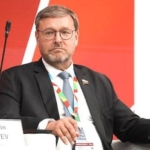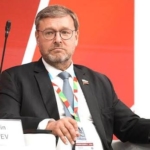
It is generally accepted that the modern era is in transition from a unipolar to a multipolar, or polycentric, model of the world order, which, obviously, will be more democratic, just, and will meet the interests of all peoples without exception.
When discussing exactly how to make this transition in practice, we will inevitably come across the fact that one of the fundamental pillars of the outgoing system is neocolonialism in all its manifestations.
It cements the inequality of states and peoples, the unjust distribution of material resources on the planet, and gives advantages to one group of the wealthiest states, which have turned their financial, economic, technological, and military superiority, firstly, into an institutional one, creating or subjugating quasi‑universal global institutions that de facto strengthen the unipolar domination of the West.
Secondly, a certain ideological and ethical base with a strong “whiff” of racism is being adjusted to this superiority. They say that rich countries are rich because they are more “advanced” in terms of civilization and differ from other, less developed cultures and civilizations. Of course, centuries of colonialism, slavery, outright robbery of other nations, as well as the current unfair model of the world order, which allows the West to “skim the cream” from world wealth and preserve inequality, all this remains outside the brackets of this approach, which is sometimes tacitly, through culture and other indirect tools, is imposed on the whole world as a civilizational self-evidences. They say, “there are animals more equal than others.”
Thirdly, within the framework of the unipolar model, a specific group of states (more “advanced” and strong) has claimed for itself the right to dictate to other countries not only the rules of behavior on the world stage – with whom to be friends, which alliances to join, against whom to impose “sanctions” – but also the principles of the country governance. People are told who to vote for, which leaders to consider legitimate, and which values to follow.
For example, the partnership agreement between the European Union and the members of the Organization of Africa, the Caribbean and the Pacific in 2023 included requirements of EU partners for the legalization of abortion, the LGBT agenda, and universal sexual education.
An attempt by some Caribbean countries, primarily Jamaica, to at least delay the signing of the document led to threats to deprive this country of extremely important external financing for the implementation of socio-economic programs.
Such a strategic position of the self-named “leader of the world”, appropriated by the West, including the moral and ethical one, as well as the ability to punish those who are objectionable with economic repression and even direct military force without any consequences for themselves — all this is one of the main pillars and feeding resources of the unipolar world system.
This gives reason to conclude that it is impossible to build a multipolar world without overcoming all forms of neocolonial inequality of states and peoples.
We are not even talking about relations between metropolises and former colonies, but about the increasing dependence on the West in various spheres of politics, economics and public life: from “international” payment instruments created, imposed and controlled by Western structures, banks, social and medical insurance systems to the introduction of openly hostile and concepts that grossly violate international law, such as the “rules-based world order”, “humanitarian intervention”, “the right to foreign aid” etc.
The first President of Ghana and philosopher Kwame Nkrumah wrote in 1965 in his work “Neocolonialism as the Last Stage of Imperialism”: “The result of neocolonialism is that foreign capital is used to exploit, rather than prosperity in less developed parts of the world. Investments under neocolonialism increase rather than decrease the gap between the rich and poor countries of the world.”
The principle of equal and equitable geographical representation has obviously been violated in international affairs. The idea of exclusivity prevails in many international organizations that are designed to serve the interests of humanity.
This is a consequence of the fact that their secretariats have been “privatized” by the West or literally stuffed with its representatives, and the institutions themselves openly serve the interests of the “golden billion”, which is a form of institutionalization of unipolarity.
The concept of classical colonialism is well-established in international law. As you know, it was enshrined in the Declaration on the Granting of Independence to Colonial Countries and Peoples, adopted by resolution 1514 (XV) of the UN General Assembly on December 14, 1960.
Western countries, shamefully denying this phenomenon, interpret the term “colonialism” exclusively in historical retrospect, as something that has long since outlived itself and remained in the past. Although these phenomena still exist today in a traditional form.
For example, statistics show that for 60 years France has been buying uranium from Niger at an extremely low price. Only in 2023, its cost was raised from 0.80 (!) to 200 euros per 1 kg. With uranium exports of about 17,000 tons per year, Niger has lost over 3.5 billion euros in the last 10 years alone.
Another example: At the Russia – Africa summit in St. Petersburg in 2023, Ugandan President Yoweri Museveni pointed out that with a global coffee market of $460 billion, African countries’ revenues do not exceed 2.5 billion, although they are the largest producers.
At the same time, Germany alone, which buys raw materials from Africans, earns about $ 6.8 billion from its processing and marketing. You can also recall the “tea superpower” Great Britain, in which, as you know, tea does not grow.
What is missing from international law today? I believe it’s time to consolidate the term “neocolonialism” in international legal documents, giving it a content that best corresponds to the real state of affairs.
Neocolonialism is a system of unequal political, economic and legal relations imposed by the collective West.
What manifestations of neocolonialism could form the basis of a new international legal term? – making countries and peoples dependent on Western creditors, insurers, banks, payment systems, etc.; – incitement of ethnic and religious conflicts, interference in the internal affairs of other states, attempts to “classify” them according to one or another far-fetched criteria of “democracy”, “freedom”, “political development”; – artificial politicization of climate change and environmental issues, including as an instrument of unfair competition against mining and technologically less developed countries; – the introduction of unilateral sanctions in violation of the UN Charter; – uncontrolled activities of multinational corporations and private military companies, especially in the field of exploration and development of natural resources; – substitution of traditional values with neoliberal ideas, their introduction into the mass consciousness of people; – the persistence of practices of segregation, apartheid, genocide and other criminal phenomena.
The Russian Federation, whose positions today are as close as possible to the point of view of most former Western colonies, has the grounds, experience, and resources to continue the struggle against neocolonialism that began in the last century.
The Russian Foreign Policy Concept, published in 2023, focuses for the first time in many years on combating neocolonial practices.
In many ways, our mission is to help the former colonies articulate their claims and prevent the former metropolises evade their historical responsibilities. And not only morally, but also financially.
At the second Russia – Africa International Parliamentary conference in March 2023, H.E. Mrs. Valentina Matvienko, the Speaker of the Federation Council proposed to raise the issue of compensation for damage to all the peoples of Africa who suffered from European colonialism.
This is a very painful topic for the West, and it makes sense to put pressure on this “brain” to those who, coincidentally, are today the main sponsors of the Kiev regime, supporters and instigators of the continuation of the conflict in Ukraine.
In February 2025, at the summit of the Caribbean Community, the Prime Minister of Grenada, Dickon Mitchell, appealed to the head of the European Commission, Ursula von der Leyen, to apologize and pay reparations for slavery. Of course, there was no reaction on the issue of reparations.
This topic is increasingly being raised in the British Commonwealth of Nations, whose heads of state include the issue of reparations payments in the final communiques of meetings, and it is becoming increasingly difficult for London to stop this activity.
The Prime Minister of the Bahamas, Philip Davis, stated bluntly: “The call for damages is not just financial compensation. It’s about recognizing the long-term consequences of centuries of exploitation and ensuring that the legacy of slavery is dealt with honestly and in good faith.”
It is necessary to help the former colonies to prevent the same Europeans from “bouncing back” on this issue, to try to bring it to the level of substantive decisions in the UN and other international organizations.
Our partners should not be afraid of the consequences of their statements, relying on the clearly articulated support of the global majority, whose position should be clearly opposed to the logic of the former metropolises. We need to support a broader representation of poor countries in the governing bodies of the United Nations and in all key global organizations.
The right to demand just compensation for damage caused because of the policies of colonialism and neocolonialism and the corresponding duty or responsibility of states practicing such methods should become a norm of international law. Unfortunately, there are currently no international legal mechanisms to protect the rights and interests of the former colonies.
However, when trying to hold the metropolises accountable for crimes of the colonial and postcolonial periods, as well as when creating new norms of international law that would allow us to legally demand recognition of guilt, payment of reparations, restitution and satisfaction, and perpetuation of memory, in practice we will inevitably encounter a number of legal obstacles that our geopolitical opponents will necessarily point out to us: the statute of limitations, the principle of intertemporality, the international legal personality of the former colonies at the time of the alleged commission of crimes, and so on.
The concept of Reparatory Justice is currently being formed in international law. Its most famous expression was the Accra Declaration, adopted in November 2023 following an international conference on Building a United Front to Promote Justice and Pay Reparations to Peoples Originating from Africa. Here are some excerpts:
– Establishment of the African Union Committee and inauguration of a Committee of Experts on Reparations to develop a unified African policy in this area;
– Establishment of a Global Reparations Fund (as of the end of 2024, consultations on its establishment are continuing);
– Formation of a transcontinental partnership (united front) to achieve historical justice;
– Study of legal and judicial options for reparations from slavery, colonialism and apartheid;
– The importance of the early repatriation and protection of African cultural artifacts exported to Europe during the colonial period;
— A call for comprehensive reforms of multilateral international institutions in order to prevent the strengthening of the global position of neocolonialism.
From my point of view, it makes sense to continue working in this direction, consolidating the countries of the world majority on the basis of the Accra Declaration.
Given the massive and time-consuming nature of colonial crimes, their statute of limitations and the difficulties in collecting evidence at the national level, special commissions are being set up to establish all the facts of the crimes committed, carefully collect information and study the consequences of imperial influence.
The most famous of these was the African Reparations Commission, which, back in 1999, managed to draw widespread attention to colonial crimes in Africa by demanding that the former metropolises pay $777 trillion in compensation for the slave trade and robberies.
We understand that the world is still in the middle, if not at the beginning, of a long road to true justice and equality based on overcoming relict neo-colonialism and compensating victims of the century-old exploitation of other countries by the West.
It is necessary to consistently promote the relevant agenda in order not only to translate the position of victims of such exploitation into legal norms and concrete decisions on reparations, but also to establish a new perspective on the past and present in the minds of all mankind.
That in the countries of the collective West, we are not dealing with a “special race” or “more developed nations” according to genetic or other controversial criteria, but with states whose well-being is based on centuries-old crimes against other peoples, which have no statute of limitations and whose consequences have not yet been overcome, condemned and compensated.
- President Commissions 36.5 Million Dollars Hospital In The Tain District
- You Will Not Go Free For Killing An Hard Working MP – Akufo-Addo To MP’s Killer
- I Will Lead You To Victory – Ato Forson Assures NDC Supporters
Visit Our Social Media for More



